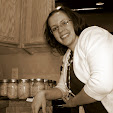
Water is ESSENTIAL no matter what your level of preparedness.
It is recommended to have one gallon of water, per person, per day, for drinking and sanitation purposes.
Don't stress. Start small.
It is recommended to store a 2 weeks supply of water. That's 14 gallons per person.
I have two weeks worth in food-grade, 5 gallon jugs like the one below.
 This is our drinking supply. For my washing water, I refill soft drink and juice bottles with water. I also refill old laundry soap and hand soap containers. Making a habit of refilling these bottles will make it easy to increase your water supply without a lot of extra thought and expense.
This is our drinking supply. For my washing water, I refill soft drink and juice bottles with water. I also refill old laundry soap and hand soap containers. Making a habit of refilling these bottles will make it easy to increase your water supply without a lot of extra thought and expense.With my water storage, I separate what is stored for home use and what I would need if we had to leave home. I have a pack of water bottles in the car. I also have a small, rolling suitcase filled with water bottles in my hall closet. It's heavy but I could fit it in the car or roll it behind me, depending on which mode of transportation I would be using in an emergency.

A light addition for your 72-hour kits could be a water purifier bottle. It may not be realistic to have 3 gallons of water in each person's kit if you have to leave your car and go somewhere on foot.

Important: Keep water containers away from heat sources and direct sunlight. Do not store plastic on cement.
Here's a great link to FEMA for more information: Water
Recent post from PreparedLDSFamily: How to Store Emergency Drinking Water
And LDS.org: Drinking Water Guidelines
This is step 1 on the PLAN 9 pamphlet put together by the Southwest Utah Public Health Department.


